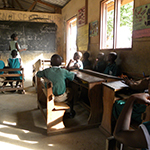
Developing and modelling collaborative creation of local OER in Teacher Education Institutions in Ghana 2015–17

Foso College, Holy Child College, Komenda College and OLA College, with The Open University UK ( Funded by the William and Flora Hewlett Foundation)
Since 2013 a caucus of teacher educators and students have been involved in TESSA OER use at four Colleges of Education in Ghana. TESSA Clubs (student run) have been established at each college and senior management have endorsed use of the TESSA OER in various aspects of the diploma programme. However extensive TESSA use has been limited by poor internet connectivity and limited off line access.
In this current project we are harnessing the evident motivation and enthusiasm for the TESSA OER within these established communities of teacher educators and students and supporting movement into the next stage - OER production, whilst also continuing to support and guide activity to embed the original TESSA OER into diploma modules across the colleges. College tutors closely involved in the project (10 at each college) will access TESSA OER through tablet pcs provided by the project and the project will explore how the tablet pc influences use and adaptation of the TESSA OER. Previous work in Nigeria indicates that tablet pcs:
- offer easy access to the TESSA OER, allowing users to frequently re-visit units and search across units to find individual activities and case studies which are of relevance to their teaching plans.
- allow critical instances of practice to be recorded to support dialogue between teacher educators and student teachers about aspects of practice; what is effective and where improvements can be made and the reasons for these.
- enable the capture of these dialogic interactions between teacher educators and student teachers.
In this project we extend the use of the tablets to support the creation of new OER.
The project explores how teacher educators and student teachers engage with TESSA OER and the consequences of this engagement for their evolving pedagogic practice. Within this overall enquiry a number of sub-questions are explored:
- what are the processes and enabling conditions which support these teacher educators and their students in actively engaging with creation and adaptation of OER at a local level to meet immediate needs?
- what skills are needed to engage in these activities?
- how do institutional and wider systemic factors influence engagement in these activities?
- how does mobile technology (tablet pcs) mediate engagement with OER including adaptation and creation of new OER?
- what is the impact of changed teacher educator practice on student teachers’ developing professional understandings and competence?
The research methodology is a qualitative case study of OER adaptation with teacher educators (tutors) and trainee teachers (students) at each college. Data sources include observations by the project team of tutors’ teaching, digital information from the tablet pcs (new OER, adapted OER and audio / image files) and interview transcripts (from interviews with tutors and students). Analysis will focus on patterns and commonalities across the colleges. During visits to the colleges the core project team from The Open University (Freda Wolfenden, Prof Patricia Murphy and Fiona Henry) will engage in an iterative research process sharing analyses with the project community (college principals and tutors) in discussion that informs the evolution of collective pedagogic practice and further data collection.
Through internal department activities in each college project tutors will be encouraged to continue to share their experiences and advocacy for TESSA, and colleges will be encouraged to continue to support the TESSA Clubs.

